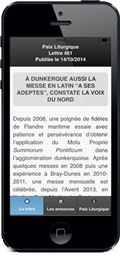Letter 75 published 28 September 2016
IN THE INDIAN OCEAN, PASTORAL PRACTICALITY AND THE EXTRAORDINARY FORM MAKE GOOD BEDFELLOWS
A group of laymen in Mauritius had been asking for Benedict XVI’s Motu Proprio to be applied on the island since 2007. Since no local priest seemed qualified for the celebration of the traditional Mass as per the Motu Proprio prescriptions, the local ordinary, Bishop Piat of Port-Louis, finally decided to kill two birds with one stone: he invited a Canon of the Institute of Christ the King Sovereign Priest to take care of this celebration and to take over the chaplaincy of three local health centers.Through this nomination Bishop Piat is responding both to a pastoral need (spiritual and sacramental aid to the sick) and to the needs of the Summorum Pontificum faithful, all the while contributing to his diocese’s liturgical enrichment and peace.*
We have pointed out this solution of a possible use of Ecclesia Dei community priests more than once: entrust chaplaincies such as hospital chaplaincies to them. It is an example of pastoral pragmatism that we gladly propose for meditation to our European pastors who are running out of priests. . . .

Bishop Piat with Canon Montjean and Canon Moreau, ICRSS.
I – BISHOP PIAT’S COMMUNIQUÉ
Canon Moreau of the Institute of Christ the King has been sent on mission to Mauritius for a renewable period of three years.
Port-Louis, 10 August 2016—The Institute of Christ the King is a congregation of priests who, while in full communion with the Pope and the bishops, celebrate Mass in the “extraordinary rite,” i.e. the Mass in Latin according to the rite of Saint Pius V that prevailed from the Council of Trent to Vatican II. Pope Benedict XVI asked the bishops to allow the Holy Mass to be celebrated in this extraordinary rite if they received a request from a group of faithful. In point of fact, a group of Mauritian laypeople have been asking me for the possibility of participating in this extraordinary rite for several years. That is why I am glad today to welcome Canon Moreau of the Institute of Christ the King, which is in full communion with Rome.
Canon Moreau will celebrate Mass in Latin according to the extraordinary rite every Sunday at Saint Joseph’s chapel at the convent of the Daughter of Mary, in Rose-Hill. He will also be the chaplain at the State hospital and at the Bon-Pasteur and Mauricienne clinics.
II – THE REFLECTIONS OF PAIX LITURGIQUE
1) Bishop Piat has been bishop of Port-Louis since 1993, after being coadjutor there, and he belongs to the Congregation of the Holy Ghost. Although it took him some time to respond to the request of the faithful desirous of benefitting from the riches of the traditional liturgy, he nevertheless did end up finding a solution that is the more satisfying for being part of the diocese’s ordinary life. Canon Moreau’s nomination was published in the diocesan weekly and, as a beautiful album of photos indicates (see here), Bishop Piat personally presided at the first Mass celebrated by Canon Moreau in Saint Joseph’s chapel in Rose-Hill on 21 August 2016.
2) Canon Moreau’s first Mass drew over 150 faithful; ensuing Masses have drawn about a hundred. At the diocesan level over 300 of the faithful signed the petition for the application of the Motu Proprio Summorum Pontificum. These numbers demonstrate that in Mauritius, as everywhere else as demonstrated by our international survey campaign, demand for the celebration of the extraordinary form is universal.
3) Rose-Hill, where Canon Moreau celebrates his Mass, is the second most populous town in a country whose majority population is Indian by descent; Hinduism is, in fact, the first religion there. Yet Catholicism amounts to 26% of the population. Furthermore the country is bilingual, and although the plan is for Canon Moreau to conduct this apostolate mainly in French, he has just arrived from an apostolate of several years in the United States (California and New Jersey) and will have no trouble communicating with his flock in English as well. We’ll wager that the bishop took the canon’s missionary experience into account when he made his decision. In fact, readiness to go on mission is a characteristic of many of the priests who are devoted to celebrating the traditional liturgy.
4) One of the more unusual aspects of Bishop Piat’s decision is that he took it, or at least formalized it, at the very time that he reached the canonical retirement age for bishops: 75. How often have we heard priests and bishops justify their refusal to apply Benedict XVI’s Motu Proprio on the grounds that they were reaching the end of their mandate and did not wish to “impose their choice” on their successor! That attitude, which is part bureaucratic part bad faith, often finds its corollary in the successor who explains to the same people with their request that he needs “to get better acquainted with the diocesan situation” before making a move. None of that in Bishop Piat, who leaves his successor with a situation that is clear and satisfactory to all concerned, Deo gratias!
-------
* Before the diocese offered a regular celebration of the traditional Mass, several Mauritian laymen turned to priests of the African district of the Society of Saint Pius X for years to have access to it. Although the bishop originally looked upon the SSPX priests’ missions with goodwill, he then opposed them and went so far as to publish a harsh communiqué warning against Archbishop Lefebvre’s foundation in 2015. It will be up to his successor to “put the pieces together again” with the future Prelature of Saint Pius X.




